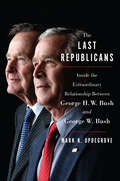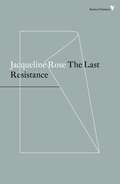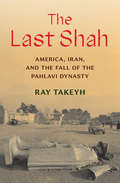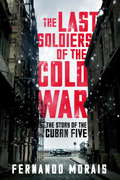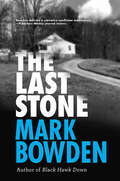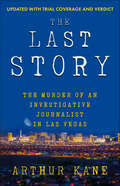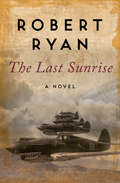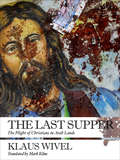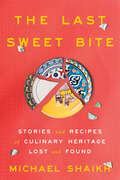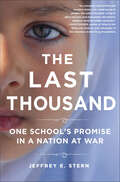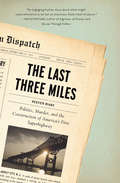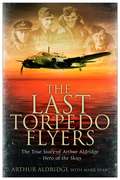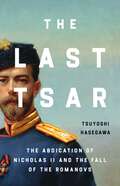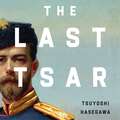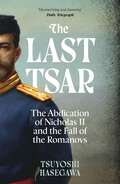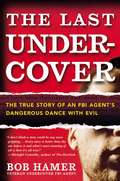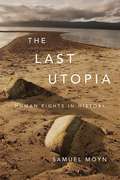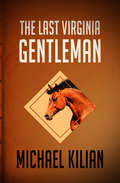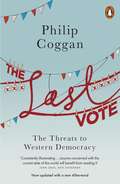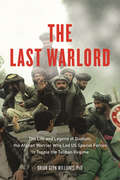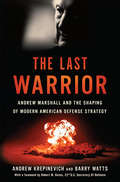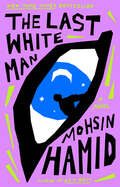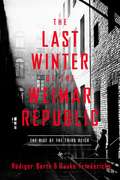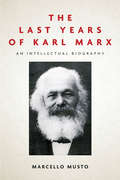- Table View
- List View
The Last Republicans: Inside the Extraordinary Relationship Between George H.W. Bush and George W. Bush
by Mark K. UpdegroveA groundbreaking look at the lives of George H. W. Bush and George W. Bush, the most consequential father-son pair in American history, often in their own words. In this revealing, often poignant work, presidential historian Mark K. Updegrove tracks the two Bush presidents from their formative years through their post-presidencies and the failed presidential candidacy of Jeb Bush, derailing the Bush presidential dynasty. Drawing extensively on exclusive access and interviews with both Bush presidents, Updegrove reveals for the first time their influences and perspectives on each other’s presidencies; their views on family, public service, and America’s role in the world; and their unvarnished thoughts on Donald Trump and the radical transformation of the Republican Party he now leads.In 2016 George W. Bush lamented privately that he might be “the last Republican president.” Donald Trump’s election marked the end not only to the Bushes’ hold on the White House, but of a rejection of the Republican principles of civility and international engagement and leadership that the Bushes have long championed.The Last Republicans offers illuminating, moving portraits of the forty-first and forty-third presidents, as well as an elegy for the Republican “establishment,” which once stood for putting the interests of the nation over those of any single man.
The Last Resistance
by Jacqueline RoseA bravura exploration of politics and writing in dark times In The Last Resistance, Jacqueline Rose explores the power of writing to create and transform our political lives. In particular, she examines the role of literature in the Zionist imagination: here, literature is presented as a unique form of dissidence, with the power to expose the unconscious of nations, and often proposing radical alternatives to their dominant pathways and beliefs. While Israel–Palestine is the repeated focus, The Last Resistance also turns to post-apartheid South Africa, to American national fantasy post-9/11, and to key moments for the understanding of Jewish culture and memory. Rose also underscores the importance of psychoanalysis, both historically in relation to the unfolding of world events, and as a tool of political understanding. Examining topics ranging from David Grossman, through W.G. Sebald, Freud, Nadine Gordimer, the concept of evil, and suicide bombers, The Last Resistance offers a unique way of responding to the crises of the times.
The Last Romantic: A Biography of Queen Marie of Roumania
by Hannah PakulaThis book is about why a woman, much less a Queen, who was a symbol of success and beauty in her own generation, should have fallen into obscurity and even disrepute within fifty years of her death.
The Last Shah: America, Iran, and the Fall of the Pahlavi Dynasty (Council on Foreign Relations Books)
by Ray TakeyhThe surprising story of Iran&’s transformation from America&’s ally in the Middle East into one of its staunchest adversaries Offering a new view of one of America&’s most important, infamously strained, and widely misunderstood relationships of the postwar era, this book tells the history of America and Iran from the time the last shah, Mohammad Reza Pahlavi, was placed on the throne in 1941 to the 1979 revolution that brought the present Islamist government to power. This revolution was not, as many believe, the popular overthrow of a powerful and ruthless puppet of the United States; rather, it followed decades of corrosion of Iran&’s political establishment by an autocratic ruler who demanded fealty but lacked the personal strength to make hard decisions and, ultimately, lost the support of every sector of Iranian society. Esteemed Middle East scholar Ray Takeyh provides new interpretations of many key events—including the 1953 coup against Prime Minister Mohammad Mossadeq and the rise of Ayatollah Ruhollah Khomeini—significantly revising our understanding of America and Iran&’s complex and difficult history.
The Last Soldiers of the Cold War
by Fernando MoraisHere is the story of political prisoners finally freed in December 2014, after being held captive by the United States since the late 1990s. Through the 1980s and 1990s, violent anti-Castro groups based in Florida carried out hundreds of military attacks on Cuba, bombing hotels and shooting up Cuban beaches with machine guns. The Cuban government struck back with the Wasp Network--a dozen men and two women--sent to infiltrate those organizations.The Last Soldiers of the Cold War tells the story of those unlikely Cuban spies and their eventual unmasking and prosecution by US authorities. Five of the Cubans received long or life prison terms on charges of espionage and murder. Global best-selling Brazilian author Fernando Morais narrates the riveting tale of the Cuban Five in vivid, page-turning detail, delving into the decades-long conflict between Cuba and the US, the growth of the powerful Cuban exile community in Florida, and a trial that eight Nobel Prize winners condemned as a travesty of justice.The Last Soldiers of the Cold War is both a real-life spy thriller and a searching examination of the Cold War's legacy.From the Trade Paperback edition.
The Last Stone: A Masterpiece Of Criminal Interrogation
by Mark BowdenThe true story of a cold case, a compulsive liar, and five determined detectives, from the #1 New York Times–bestselling author and &“master journalist&” (The Wall Street Journal). On March 29, 1975, sisters Katherine and Sheila Lyons, ages ten and twelve, vanished from a shopping mall in suburban Washington, DC As shock spread, then grief, a massive police effort found nothing. The investigation was shelved, and the mystery endured. Then, in 2013, a cold case squad detective found something he and a generation of detectives had missed. It pointed them toward a man named Lloyd Welch, then serving time for child molestation in Delaware. The acclaimed author of Black Hawk Down and Hue 1968 had been a cub reporter for a Baltimore newspaper at the time of the original disappearance, and covered the frantic first weeks of the story. In The Last Stone, he returns to write its ending. Over months of intense questioning and extensive investigation of Welch&’s sprawling, sinister Appalachian clan, five skilled detectives learned to sift truth from determined lies. How do you get a compulsive liar with every reason in the world to lie to tell the truth? The Last Stone recounts a masterpiece of criminal interrogation, and delivers a chilling and unprecedented look inside a disturbing criminal mind. &“One of our best writers of muscular nonfiction.&” —The Denver Post &“Deeply unsettling . . . Bowden displays his tenacity as a reporter in his meticulous documentation of the case. But in the story of an unimaginably horrific crime, it&’s the detectives&’ unwavering determination to bring Welch to justice that offers a glimmer of hope on a long, dark journey.&” —Time
The Last Story: The Murder of an Investigative Journalist in Las Vegas
by Arthur KaneTHE LAST STORY: The Murder of an Investigative Journalist in Las Vegas is an exclusive deep dive into a chilling true tale of sex, ambition, retribution, and homicide. Jeff German, a veteran Las Vegas Review-Journal investigative reporter, was no stranger to controversy or the danger of his work. For more than four decades, he wrote stories relentlessly confronting the mob, corrupt politicians, and greedy bureaucrats. As a result, he was often threatened—enough that he and his friend and fellow investigative reporter, Arthur Kane, sometimes joked about reporting on these threats if they were ever acted upon. Then, in the spring of 2022, German received a tip about abuses at a little-known county office. His subsequent investigation unearthed a scandalous, sexually incriminating video of a rising politician, Robert Telles. The resulting stories in the Review-Journal ended Telles's political aspirations. Less than six months later, on September 3, German's lifeless body was discovered outside his home with multiple stab wounds. His dedicated newsroom colleagues, including Kane, vowed to find the killer. In doing so, they exposed the true depths of corruption and malice in Sin City. Meanwhile, the police struggled to identify a suspect until they released a photo of the suspect's vehicle to the media. That tip led them to none other than Robert Telles, who was subsequently arrested. In August 2024, with the national media in attendance at his trial, Telles was convicted of first-degree murder and later sentenced to twenty years in prison. In THE LAST STORY, Kane delivers an intense narrative of courage, betrayal, and the unrelenting quest for justice.
The Last Sunrise: A Novel (The Post-War Trilogy #2)
by Robert RyanThe real history of World War II&’s most daring fighter squadron is the inspiration for this riveting novel of adventure and romance in the Far East Three years after the liberation of Singapore, transport pilot Lee Crane is finally ready to leave. The Berlin airlift is on, and there&’s decent money to be made if you possess both your own plane and a practiced disregard for safety. One last drink with his Indo-Air fly buddies at the Long Bar in Raffles hotel and Crane is gone. Then he sees her: the tall, beautiful redhead he had every reason to believe was dead. If Elsa is alive—and still angry, judging by the sock to the jaw she greets him with—what else might Crane have gotten wrong about the past? In 1941, Lee Crane was a Flying Tiger, one of dozens of American pilots recruited to join the Chinese Air Force in the fight against the Japanese. Wild in the air and on the ground, the Tigers broke hearts all over Burma, and Crane was no different—until he fell in love with a stunning Anglo-Indian widow. But in the chaos of war, Crane lost track of the woman of his dreams, and spent the next seven years convincing himself it wasn&’t meant to be. Now a chance encounter with another long-lost beauty has him ready to plunge back into the past, praying he will come up with a different answer this time. The Last Sunrise is the 2nd book in the Post-War Trilogy, which also includes After Midnight and Dying Day.
The Last Supper: The Plight of Christians in Arab Lands
by Klaus Wivel&“A compelling story of the ethnic cleansing of Christian communities caught in the crossfire of the Middle East at war . . . Urgent and passionate&” (Kirkus Reviews). In 2013, alarmed by scant attention paid to the hardships endured by the 7.5 million Christians in the Middle East, journalist Klaus Wivel—who practices no religion himself—traveled to Iraq, Lebanon, Egypt, and the Palestinian territories on a quest to learn more about their fate. He found an oppressed minority, constantly under threat of death and humiliation, increasingly desperate in the face of rising Islamic extremism and without hope that their situation would improve, or anyone would come to their aid. Wivel spoke with priests whose churches have been burned, citizens who feel like strangers in their own countries, and entire communities whose only hope for survival may be fleeing into exile. With the increase of religious violence in recent years, The Last Supper is a prescient and unsettling account of a severely beleaguered religious group living, so it seems, on borrowed time. In this book, Wivel recounts this humanitarian crisis in detail and asks why we have we not done more to protect these people.
The Last Sweet Bite: Stories and Recipes of Culinary Heritage Lost and Found
by Michael ShaikhA powerful and heartwarming exploration of cuisine in conflict zones, highlighting the courageous persistence of people struggling to protect their food culture in the face of war, genocide, and violence.&“The Last Sweet Bite tells the powerful and personal stories of the heroic home cooks fighting to keep their food—and their identity—alive.&”—José Andrés, founder of World Central KitchenWar changes every part of human culture: art, education, music, politics. Why should food be any different? For nearly twenty years, Michael Shaikh&’s job was investigating human rights abuses in conflict zones. Early on, he noticed how war not only changed the lives of victims and their societies, it also unexpectedly changed the way they ate, forcing people to alter their recipes or even stop cooking altogether, threatening the very survival of ancient dishes.A groundbreaking combination of travel writing, memoir, and cookbook, The Last Sweet Bite uncovers how humanity&’s appetite for violence shapes what&’s on our plate. Animated by touching personal interviews, original reporting, and extraordinary recipes from modern-day conflict zones across the globe, Shaikh reveals the stories of how genocide, occupation, and civil war can disappear treasured recipes, but also introduces us to the extraordinary yet overlooked home cooks and human rights activists trying to save them. From a sprawling refugee camp in Bangladesh and a brutal civil war in Sri Lanka to the drug wars in the Andes and the enduring effects of America&’s westward expansion, Shaikh highlights resilient diasporic communities refusing to let their culinary heritage become another casualty of war.Much of what we eat today or buy in a market has been shaped by violence; in some form, someone&’s history and politics is on the dinner table. The Last Sweet Bite aims to tell us how it got there. Weaving together histories of food, migration, human rights, and recipes, Shaikh shows us how reclaiming lost cuisines is not just a form of resistance and hope but also how cooking can be a strategy for survival during trying times.
The Last Thousand: One School's Promise in a Nation at War
by Jeffrey E. SternUnder the protection of foreign forces, a special place has flourished in Afghanistan. The Marefat School is an award-winning institution in the western slums of Kabul, built by one of the country’s most vulnerable minorities, the Hazara. Marefat educates both girls and boys; it teaches students to embrace the arts, criticize their leaders, interrogate their religion, and be active citizens in a rapidly changing country. But they are dependent on foreign forces for security. When the United States begins to withdraw from Afghanistan, they are left behind, unprotected.Acclaimed journalist Jeffrey E. Stern explores the stakes of war through the eyes of those touched by Marefat: the school’s daring founder and leader, Aziz Royesh; a mother of five who finds freedom in literacy; a clever mechanic; a self-taught astronomer; the school’s security director; and several intrepid students who carry Marefat’s mission to the streets.We see how Marefat has embraced the United States and blossomed under its presence---and how much it stands to lose as that protection disappears. The Last Thousand tells the story of what we leave behind when our foreign wars end. It shows us up close the promise, as well as the peril, of our military adventures abroad. Stern presents a nuanced and fascinating portrait of the complex history of Afghanistan, its American occupation, and the ways in which once community rallies together in compelling, heartbreaking, and inspiring detail.
The Last Three Miles: Politics, Murder, and the Construction of America's First Superhighway
by Steven HartAn investigative history of Depression Era power brokers and labor wars in the construction of the Pulaski Skyway across the New Jersey Meadowlands. In the 1930s, as America&’s love affair with the automobile began, cars and trucks leaving the nation&’s largest city were dumped out of the Holland Tunnel onto local roads winding through New Jersey swampland. The Pulaski Skyway, America&’s first &“superhighway,&” would change all that by connecting the hub of New York City to the rest of the country. But the corrupt and violent path to its completion would change much more for Jersey City&’s residents and labor unions. Jersey City mayor Frank Hague—dictator of the Hudson County political machine and a national political player—was a prime mover behind the ambitious transit project. Hague&’s nemesis in this undertaking was union boss Teddy Brandle. Construction of the last three miles of the Pulaski Skyway, then simply known as Route 25, marked an epic battle between big labor and big politics, culminating in a murder and the creation of a motorway so flawed it soon became known as &“Death Avenue&”—appropriately featured in the opening sequence of HBO&’s hit series The Sopranos. A book in the tradition of Robert Caro&’s The Power Broker and Henry Petroski&’s Engineers of Dreams, The Last Three Miles brings to vivid life a riveting and bloodstained chapter in the heroic age of public works. &“A revealing look into how local politics can affect the design and construction of our national infrastructure, sometimes with disastrous results. Hart uses his considerable narrative talent to tell an engaging human story about what might seem otherwise to be but an enormous black steel structure.&” —Henry Petroski, author of Engineers of Dreams and Success Through Failure
The Last Torpedo Flyers
by Mark Ryan Arthur AldridgeImagine you are an RAF torpedo pilot in World War Two, sent on missions so dangerous that you're later likened to the Kamikaze. Suicide wasn't a recognised part of the objective for British airmen, yet some pilots felt they had accepted certain death just by climbing into their cockpits. There were times in 1942 when Arthur Aldridge felt like this. At the age of 19, this courageous young man had quit his studies at Oxford to volunteer for the RAF. He flew his Bristol Beaufort like there was no tomorrow - a realistic assumption, after seeing his best friend die in flames at the end of 1941. Aldridge was awarded a DFC (Distinguished Flying Cross) for his bravery on the same strike on a German cargo ship during which he lost a wing tip by flying too close to the deck. He was equally lucky to survive his squadron's chaotic torpedo attack on the giants of Hitler's maritime fleet during the notorious Channel Dash, which saw 40 RAF planes shot down. As 1942 wore on, and the stress became intolerable, Aldridge and his Cockney gunner Bill Carroll held their nerve, and 'Arty' was awarded a Bar to his DFC for sinking two enemy ships off Malta and rescuing a fellow pilot while wounded, as his own Beaufort took four shells. Malta was saved by the skin of its teeth, Rommel denied vital supplies in North Africa, and the course of the war was turned. Aldridge was still only 21 years old. Now both 91, but firm friends as ever, Aldridge and Carroll are two of the last torpedo airmen who deserve their place in history alongside our heroic Spitfire pilots. Their story vividly captures the comradeship that existed between men pushed by war to their very limit.
The Last Tsar: The Abdication of Nicholas II and the Fall of the Romanovs
by Tsuyoshi Hasegawa&“Elegantly written and magisterially researched&” (Robert Service, author of A History of Modern Russia), the definitive story behind the self-destruction of the autocratic Romanov dynasty, by the world&’s foremost expert When Tsar Nicholas II fell from power in 1917, Imperial Russia faced a series of overlapping crises, from war to social unrest. Though Nicholas&’s life is often described as tragic, it was not fate that doomed the Romanovs—it was poor leadership and a blinkered faith in autocracy. Based on a trove of new archival discoveries, The Last Tsar narrates how Nicholas&’s resistance to reform doomed the monarchy. Encompassing the captivating personalities of the era, it untangles the struggles between the increasingly isolated Nicholas and Alexandra and the factions of scheming nobles, ruthless legislators, and pragmatic generals who sought to stabilize the restive Russian empire either with the Tsar or without him. By rejecting compromise, Nicholas undermined his supporters at crucial moments. His blunders cleared the way for all-out civil war and the eventual rise of the Soviet Union. Definitive and engrossing, The Last Tsar uncovers how Nicholas II stumbled into revolution, taking his family, the Romanov dynasty, and the whole Russian Empire down with him.
The Last Tsar: The Abdication of Nicholas II and the Fall of the Romanovs
by Tsuyoshi HasegawaA HISTORY TODAY BOOK OF THE YEAR'Certain to become the definitive work' DOUGLAS SMITH'Elegantly written and magisterially researched' ROBERT SERVICE'Masterful . . . a chilling lesson' VLADISLAV ZUBOKThe definitive story behind the self-destruction of the autocratic Romanov dynasty, by the world's foremost expert.When Tsar Nicholas II fell from power in 1917, Imperial Russia faced a series of overlapping crises, from war to social unrest. Though Nicholas's life is often described as tragic, it was not fate that doomed the Romanovs - it was poor leadership and a blinkered faith in autocracy.Based on a trove of new archival discoveries, The Last Tsar narrates how Nicholas's resistance to reform doomed the monarchy. Encompassing the captivating personalities of the era, it untangles the struggles between the increasingly isolated Nicholas and Alexandra and the factions of scheming nobles, ruthless legislators, and pragmatic generals who sought to stabilize the restive Russian empire either with the Tsar or without him. By rejecting compromise, Nicholas undermined his supporters at crucial moments. His blunders cleared the way for all-out civil war and the eventual rise of the Soviet Union.Definitive and engrossing, The Last Tsar uncovers how Nicholas II stumbled into revolution, taking his family, the Romanov dynasty, and the whole Russian Empire down with him.
The Last Tsar: The Abdication of Nicholas II and the Fall of the Romanovs
by Tsuyoshi HasegawaA HISTORY TODAY BOOK OF THE YEAR'Certain to become the definitive work' DOUGLAS SMITH'Elegantly written and magisterially researched' ROBERT SERVICE'Masterful . . . a chilling lesson' VLADISLAV ZUBOKThe definitive story behind the self-destruction of the autocratic Romanov dynasty, by the world's foremost expert.When Tsar Nicholas II fell from power in 1917, Imperial Russia faced a series of overlapping crises, from war to social unrest. Though Nicholas's life is often described as tragic, it was not fate that doomed the Romanovs - it was poor leadership and a blinkered faith in autocracy.Based on a trove of new archival discoveries, The Last Tsar narrates how Nicholas's resistance to reform doomed the monarchy. Encompassing the captivating personalities of the era, it untangles the struggles between the increasingly isolated Nicholas and Alexandra and the factions of scheming nobles, ruthless legislators, and pragmatic generals who sought to stabilize the restive Russian empire either with the Tsar or without him. By rejecting compromise, Nicholas undermined his supporters at crucial moments. His blunders cleared the way for all-out civil war and the eventual rise of the Soviet Union.Definitive and engrossing, The Last Tsar uncovers how Nicholas II stumbled into revolution, taking his family, the Romanov dynasty, and the whole Russian Empire down with him.
The Last Undercover: The True Story of an FBI Agent's Dangerous Dance with Evil
by Bob HamerA 26-year veteran of the FBI reflects on the challenges he has endured and overcome, as he stared the dark side of humanity in the face and never blinked.
The Last Utopia: Human Rights In History
by Samuel MoynThe Last Utopia shows that it was in the decade after 1968 that human rights began to make sense to broad communities of people as the proper cause of justice. Across eastern and western Europe, as well as throughout the United States and Latin America, human rights crystallized in a few short years as social activism and political rhetoric moved it from the hallways of the United Nations to the global forefront. It was on the ruins of earlier political utopias, Moyn argues, that human rights achieved contemporary prominence. The morality of individual rights substituted for the soiled political dreams of revolutionary communism and nationalism as international law became an alternative to popular struggle and bloody violence. But as the ideal of human rights enters into rival political agendas, it requires more vigilance and scrutiny than when it became the watchword of our hopes.
The Last Virginia Gentleman
by Michael KilianA counterfeit stallion lures a Virginia horseman into a billion-dollar conspiracy Vicky Clay awakes with chills. She’s still glowing from her victory in last night’s steeplechase—the genteel form of horseracing for which the Virginia gentry lives and dies—but that’s not why her skin tingles. She has been poisoned, and within seconds, she’s as useless to the world as a thoroughbred with a broken leg. The stakes are high in the world of Virginia horseracing, where fortunes are won and lost by a hair. Captain David Showers, whose family has bred racing horses since before the Revolutionary War, knows how quickly luck can change. When he gets the chance to buy the descendant of a legendary mare, he leaps at the opportunity to revitalize his family stables. But the horse’s bloodline turns out to be a fabrication of the mafia, and Showers will have to ride faster than ever if he wants to stay alive.
The Last Vote: The Threats to Western Democracy
by Philip CogganThe Last Vote is a wake-up call showing why we cannot afford to take democracy for granted, from Philip Coggan, award-winning author of Paper Promises and The Money MachineCan we afford to take democracy for granted? It's now so much a part of our lives that we could be forgiven for thinking it mainly takes care of itself. Almost half the world's population now lives in a democratic state, while some Western democracies have now had universal suffrage for almost a century and have endured through even the most severe of global upheavals. In The Last Vote, Philip Coggan shows how democracy today faces threats that we ignore at our own risk. Amid the turmoil of the financial crisis, high debt levels, and an ever-growing gap between the richest and the rest, it is easy to forget that the ultimate victim could be our democracy itself. Tracing democracy's history and development, from the classical world through the revolution of the Enlightenment and on to its astounding success in the nineteenth and twentieth centuries, Coggan revisits the assumptions on which it is founded. What exactly is democracy? Why should we value it? What are its flaws? And could we do any better?The Last Vote is a wake-up call, and an illuminating defence of a system, which, in Churchill's words, is the worst possible form of government, except for all the others that have been tried. Reasoned, lucid and balanced, Coggan's argument parrots neither the agenda of left nor right, but calls for us all to work together to ensure we don't end up in an even greater mess than we're in today. Finally, he proposes ideas for change and improvement to the system itself so the next vote we cast will not be the last.Praise for Paper Promises:'This book stands way above anything written on the present economic crisis' Nassim Taleb, author of The Black Swan'Bold and confident... This book should be taken very seriously' John Authers, Financial Times'The most illuminating account of the financial crisis to appear to date ... written with a lucidity that conveys deep insights without a trace of jargon' John Gray, New StatesmanPhilip Coggan was a Financial Times journalist for over twenty years, and is now the Buttonwood columnist for the Economist. In 2009 he was named Senior Financial Journalist in the Harold Wincott awards and was voted Best Communicator at the Business Journalist of the Year Awards. He is the author of The Money Machine, and Paper Promises, winner of the Spears Business Book of the Year Award and longlisted for the Financial Times Goldman Sachs Business Book of the Year Award.
The Last Warlord: The Life and Legend of Dostum, the Afghan Warrior Who Led US Special Forces to Topple the Taliban Re
by Brian WilliamsChronicling the spectacular rise to power of General Abdul Rashid Dostum, this is an intimate profile of the one of the most powerful warlords to have dominated Afghanistan in the years since the Soviet withdrawal in the late 1980s. His rise from simple peasant villager to warrior against the repressive policies of the Taliban and Al Qaeda is told by one of the few outsiders to be accepted into Dostum's stronghold in the northern deserts of Afghanistan. Thanks to this unprecedented access, author Brian Glyn Williams was able to conduct lengthy interviews with Dostum and his family, as well as his subcommanders, local chieftains, mullahs, Taliban enemies, prisoners of war, and women's rights activists. What emerges is an intensely personal account of the Mongol warlord, detailing his childhood, motivations, hopes for his country, and conviction that it is time for a new generation of Western-trained technocrats to shape his country's destiny. With the drawing down of U.S. troops in 2014 and Dostum poised to reenter the world stage to fight a resurgent Taliban, this timely analysis provides important historical context to the controversy swirling around Afghanistan's warlord culture and is an essential contribution to the debate on Afghanistan's future.
The Last Warrior: Andrew Marshall and the Shaping of Modern American Defense Strategy
by Andrew F. Krepinevich Barry D. WattsAndrew Marshall is a Pentagon legend. For more than four decades he has served as Director of the Office of Net Assessment, the Pentagon's internal think tank, under twelve defense secretaries and eight administrations. Yet Marshall has been on the cutting edge of strategic thinking even longer than that. At the RAND Corporation during its golden age in the 1950s and early 1960s, Marshall helped formulate bedrock concepts of US nuclear strategy that endure to this day; later, at the Pentagon, he pioneered the development of "net assessment"-a new analytic framework for understanding the long-term military competition between the United States and the Soviet Union. Following the Cold War, Marshall successfully used net assessment to anticipate emerging disruptive shifts in military affairs, including the revolution in precision warfare and the rise of China as a major strategic rival of the United States.In The Last Warrior, Andrew Krepinevich and Barry Watts-both former members of Marshall's staff-trace Marshall's intellectual development from his upbringing in Detroit during the Great Depression to his decades in Washington as an influential behind-the-scenes advisor on American defense strategy. The result is a unique insider's perspective on the changes in US strategy from the dawn of the Cold War to the present day.Covering some of the most pivotal episodes of the last half-century and peopled with some of the era's most influential figures, The Last Warrior tells Marshall's story for the first time, in the process providing an unparalleled history of the evolution of the American defense establishment.
The Last White Man: A Novel
by Mohsin HamidNAMED A BEST BOOK OF THE SUMMER BY TIME, ELLE, USA TODAY, ENTERTAINMENT WEEKLY AND MORE&“Perhaps Hamid&’s most remarkable work yet … an extraordinary vision of human possibility.&” –Ayad Akhtar, author of Homeland Elegies &“Searing, exhilarating … reimagines Kafka&’s iconic The Metamorphosis for our racially charged era.&” Hamilton Cain, Oprah DailyFrom the New York Times-bestselling author of Exit West, a story of love, loss, and rediscovery in a time of unsettling change. One morning, a man wakes up to find himself transformed. Overnight, Anders&’s skin has turned dark, and the reflection in the mirror seems a stranger to him. At first he shares his secret only with Oona, an old friend turned new lover. Soon, reports of similar events begin to surface. Across the land, people are awakening in new incarnations, uncertain how their neighbors, friends, and family will greet them.Some see the transformations as the long-dreaded overturning of the established order that must be resisted to a bitter end. In many, like Anders&’s father and Oona&’s mother, a sense of profound loss and unease wars with profound love. As the bond between Anders and Oona deepens, change takes on a different shading: a chance at a kind of rebirth--an opportunity to see ourselves, face to face, anew. In Mohsin Hamid&’s &“lyrical and urgent&” prose (O Magazine), The Last White Man powerfully uplifts our capacity for empathy and the transcendence over bigotry, fear, and anger it can achieve.
The Last Winter of the Weimar Republic: The Rise Of The Third Reich
by Rüdiger Barth Hauke FriederichsA thrilling day-by-day account of the final months of the Weimar Republic, documenting the collapse of democracy in Germany and Hitler’s frightening rise to power. November 1932. With the German economy in ruins and street battles raging between rival political parties, the Weimar Republic is on its last legs. In the halls of the Reichstag, party leaders scramble for power and influence as the elderly president, Paul von Hindenburg, presides over a democracy pushed to the breaking point. Chancellors Franz von Papen and Kurt von Schleicher spin a web of intrigue, vainly hoping to harness the growing popularity of Adolf Hitler’s Nazi Party while reining in its most extreme elements. These politicians struggle for control of a turbulent city where backroom deals and frightening public rallies alike threaten the country’s fragile democracy, with terrifying consequences for both Germany and the rest of the world. In The Last Winter of the Weimar Republic, Barth and Friedrichs have drawn on a wide array of primary sources to produce a colorful, multi-layered portrait of a period that was by no means predestined to plunge into the abyss, and which now seems disturbingly familiar.
The Last Years of Karl Marx: An Intellectual Biography
by Marcello MustoAn innovative reassessment of the last writings and final years of Karl Marx. In the last years of his life, Karl Marx expanded his research in new directions—studying recent anthropological discoveries, analyzing communal forms of ownership in precapitalist societies, supporting the populist movement in Russia, and expressing critiques of colonial oppression in India, Ireland, Algeria, and Egypt. Between 1881 and 1883, he also traveled beyond Europe for the first and only time. Focusing on these last years of Marx's life, this book dispels two key misrepresentations of his work: that Marx ceased to write late in life, and that he was a Eurocentric and economic thinker fixated on class conflict alone. With The Last Years of Karl Marx, Marcello Musto claims a renewed relevance for the late work of Marx, highlighting unpublished or previously neglected writings, many of which remain unavailable in English. Readers are invited to reconsider Marx's critique of European colonialism, his ideas on non-Western societies, and his theories on the possibility of revolution in noncapitalist countries. From Marx's late manuscripts, notebooks, and letters emerge an author markedly different from the one represented by many of his contemporary critics and followers alike. As Marx currently experiences a significant rediscovery, this volume fills a gap in the popularly accepted biography and suggests an innovative reassessment of some of his key concepts.
